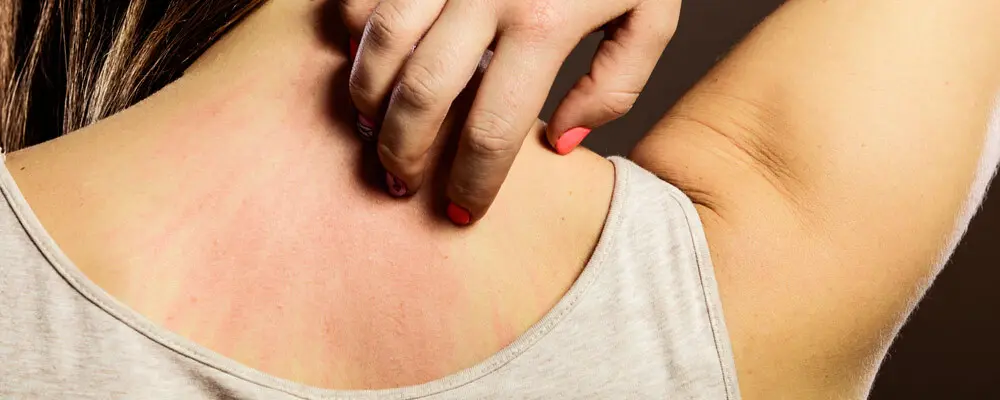Overview:
Stress is one of the leading causes of many underlying medical conditions. Excessive stress, when left unattended puts one under severe physical and mental health issues that reflect in different forms. Stress rash is one of them. It is caused by stress in people who have underlying skin problems. Stress rash is basically an exacerbation of symptoms of an underlying skin condition. People who have skin conditions need to be extra diligent and opt for activities that help circumvent stress to prevent the exacerbation and appearance of stress rashes.
This blog will be focused on discussing whether stress cause rashes, how long stress rashes last and stress rash treatment.
Etiology Of Stress Rash: Can Stress Cause Rashes?
People with underlying skin disorders like eczema, rosacea, or allergies caused by environmental triggers like pollen, animal dander, or particular foods are frequently affected by stress rash. Even if sunlight or weather changes, people can get rashes. Still, stress rash can still manifest even in the absence of an underlying disease.
Some other causes of stress rash include:
- Exercise,
- Extreme weather,
- Different fabrics,
- Infections,
- Food,
- Pollen,
- Sunlight, and
- Sweat.
Types Of Stress Rash:
Broadly, it is classified into two types; depending on how long stress rashes last:
- Acute: Stress rashes that last less than 6 weeks are considered acute.
- Chronic: Stress rashes that last more than 6 weeks is called chronic stress rash.
How Can Stress Cause Rashes?
When a person is stressed, a pathway called the hypothalamus pituitary adrenal axis is activated. This results in the release of cortisol, stress hormones, and mast cells. Mast cells are responsible for itchy and irritated skin as they produce histamine. However, how the chemical histamine results in stress are still not clear.
How Does A Stress Rash Look Like?
Hives, or raised red bumps, are common symptoms of stress rashes. Although they can appear anywhere on the body, stress rashes frequently appear on the face, neck, chest, or arms. Hives can occur in clusters and range in size from microscopic spots to enormous welts. They could itch, burn, tingle, or cause a burning feeling.
How Long Do Stress Rashes Last?
Stress rashes usually go away on their own within a few days after appearing. However, sometimes it persists for six weeks or more. It is important to understand that constant scratching can make it worse as it paves way for bacteria to enter the skin. This may delay the healing process.
How Can Stress Rash Be Minimized?
It is very common to experience stress due to various reasons. It is a usual response of our body to specific triggers. It is worth noting that the side effects of stress are very real and can be severe if not addressed on time.
However, the good part is that stress can be managed naturally as well. Some of the effective techniques are:
- Place a cool compress on the affected area to relieve the itch,
- Lukewarm showers,
- Stay hydrated,
- Avoid hot showers, and
- Avoid clothes that come in close contact with your body.
Other Ways In Stress Rash Treatment & Management:
Knowing your triggers and taking proactive steps to avoid stress and stress rashes in the first place, is crucial if you are prone to developing them.
If you have a stress rash, you may need to find a better approach to deal with your worry and anxiety. It’s crucial to have effective stress-coping mechanisms.
- Dispute Negative Ideas:
Anxiety sensations might be triggered by negative thoughts. You can replace these unfavorable thoughts with more sensible, constructive ones by developing the ability to recognize and then confront negative ones. - Alter the Situation:
Consider what you can do to alter the situation if something in your life is giving you a lot of anxiety. This can entail reducing your responsibilities, assigning some tasks to others, or establishing boundaries with people around you. - Make a Journal:
According to research, writing for the explicit purpose of relieving anxiety may be beneficial. Consider keeping a notebook in which you can record your experiences and things for which you are thankful. Try to write everything that you feel but can not share with anyone else. This will help you release your stress and make you feel better. - Seek Professional Help:
If anxiety is not treated, it can hurt your life and get worse over time. Speak with a mental health professional if you believe that your anxiety is significantly impacting your quality of life or making it difficult for you to carry out your typical daily activities. There are effective treatments available to help you manage your anxiety.
Stress Rash Treatment:
You should consult a doctor if your symptoms get worse or last for more than six weeks. Chronic hives are those that persist for more than six weeks and may or may not go away on their own within a year. Mostly, doctors prescribe an antihistamine, corticosteroid, or immunosuppressant for stress rash as well.
Antihistamines are considered to be the most effective stress rash treatment option, as it helps to relieve symptoms of itch and inflammation.
Outlook:
The major culprit of stress rash, as the name suggests is stress. It can be difficult to deal with and you may need professional help. It is important to know that it is completely okay to seek help if you are going through tough times as stress manifests in various deadly ways.
A stress rash usually disappears in a few days however, if stress is not managed, the stress rash might persist for a long time. It is vital to take care of your mental health especially if you have an underlying skin condition as stress can exacerbate your symptoms and result in stress rash too.




